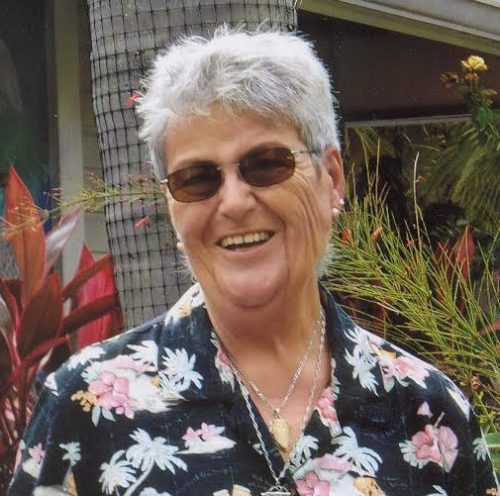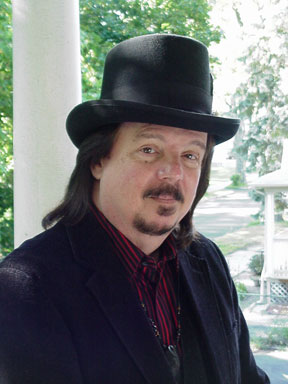 In an update to a past report, David Hindsley and Nicole Leffert have both been sentenced to 42 years in prison with a two-year probation for three felony counts of sexual crimes, including the conspiracy to commit child molesting and child molesting. Leffert received her sentence Jan. 10, and Hindsley was sentenced last week.
In an update to a past report, David Hindsley and Nicole Leffert have both been sentenced to 42 years in prison with a two-year probation for three felony counts of sexual crimes, including the conspiracy to commit child molesting and child molesting. Leffert received her sentence Jan. 10, and Hindsley was sentenced last week.
Before their arrest in May 2016, Hindsley and Leffert were active members of Indiana’s Heathen community. They both worked as artisans, making kilts and jewelry. The couple owned an Etsy shop and Facebook page called Heathen Spirit. In a 2014 article published in Purdue University’s student newspaper The Exponent, Hindsley was interviewed about the health benefits of wearing kilts. At one point, they had attempted to start a new kindred in their home town.
According to local news, the two unnamed victims were a four-year old child and a two-month-old baby. The crimes were discovered after Hindsley and Leffert shared pictures, texts, and Facebook messages about the acts. “At Hindsley’s sentencing Thursday,” reports WLFI, “the judge, prosecutor and detective called this case the sickest they’ve ever encountered working in the criminal justice system.”
* * *
 It was announced last week that Renata Burnham, known to many as Lady Siobhan, died Apr. 6. Born in Czechoslovakia on Feb. 15, 1939, Lady Siobhan would recall being an only child and running from Nazis as they invaded her homeland. After spending time in Germany, she moved to the U.S. at the age of 18.
It was announced last week that Renata Burnham, known to many as Lady Siobhan, died Apr. 6. Born in Czechoslovakia on Feb. 15, 1939, Lady Siobhan would recall being an only child and running from Nazis as they invaded her homeland. After spending time in Germany, she moved to the U.S. at the age of 18.
She eventually met her husband, Allan, and gave birth to three children. Although never divorced, the two grew apart as a couple, and Lady Siobhan eventually developed a new relationship with her beloved partner Aditi; it would last 42 years. After years of handfastings, their marriage was officially recognized for the very first time Oct. 23, 2016.
Lady Siobhan came into Paganism in 1971, joining the New Jersey-based Witches of Wickatunk in 1975. She went on to earn her third degree. Eventually, the couple moved to Georgia where they joined Coven Finneces, and then Olde Stone Grove of the Keltoi Tradition of Druids. Along with her specific Craft studies, Lady Siohban was certified in numerology, studied general metaphysics, and earned her ministerial credentials through the Progressive Universal Life Church. More recently, she had become a member of the Georgia-based Willow Dragonstone Community.
In recent years, it was discovered that Lady Siobhan had developed lung cancer as well as brain cancer. In addition, she had diabetes as a result of steroid treatments. Lady Siobhan died in her home with Aditi by her side on Apr. 6. Her life was honored Apr. 9, 2017 at Crowell Brothers’ Funeral Home in Buford, Georgia. Willow Dragonstone Community will be hosting an outdoor ceremony the weekend of June 24, 2017. The location has not been announced. What is remembered, lives.
* * *

Author Raven Grimassi made a personal announcement Sunday about his health. In an open letter on his site, Grimassi said, “In January of 2016, I was diagnosed with pancreatic cancer, terminal stage four, and was given 1 to 3 months to live if I did nothing, and 6 months to live if I did chemo.”
He goes on to say that he started chemo in March 2016, which landed him in the hospital in critical condition. Grimassi recounts the experience while there and his varied encounters with deity and death. At the time, the doctors did not believe his condition could be turned around. That was Easter Sunday, 2016.
Grimassi writes, “Here it is a year later this day on Easter Sunday. Not only am I still alive, but my last two CT-Scans showed no visible traces of any tumors or signs of cancer anywhere in my body. All my blood work is completely normal.” In his post, Grimassi reflects on the year, calling it a Shamanic experience. He is now developing “a workshop on communication with the body, mind and spirit for personal healing and transformation.”
In other news
- Several Pagans and Heathens were at the Berkeley rally and protest on Saturday. We will have accounts on what they saw and experienced in the coming week.
- Ardantane Learning Center has launched a fundraising campaign to finish what they call their “uncommon” room. Located in the Jemez Mountains of New Mexico, Ardantane provides both in-person and virtual educational opportunities for its students. According to its press release, “The Board of Directors estimates that [it] will need $30,000 for the next phase of construction.”
- Blogger Mat Auryn and author Vivienne Moss are “seeking submissions for Hekate: Timeless Titaness, a massive anthology in honor of Hekate.” Submissions are due Dec. 1. Details can be found on Auryn’s website.
- Florida Pagan Gathering kicks off this weekend in Lake Wales. Featured guests include Jason Mankey, Patti Wigington, and Jason Augustus Newcomb. Musical headlines are Wendy Rule and Brian Henke.
- Two events this week are planned to commemorate the tenth anniversary of the “pentacle quest” to get the emblem approved for military headstones. Tomorrow, Apr. 18, Rev. Selena Fox will dedicate her podcast to a discussion and call-in show about the pentacle quest, while on Sun, Apr. 23 — the anniversary itself — Fox and Rev. Dave Sassman will co-officiate a ceremony at Circle Sanctuary. More information on both events is available at the Circle Sanctuary web site.
- Blogger John Halstead published a new post titled, “It’s been 50 years and what have Pagans accomplished.” The post begins, “Contemporary Paganism, as it exists today, began with the Counterculture movement of the 1960s and 1970s. Religious studies scholar, Sarah Pike dates the origins of contemporary Paganism to 1967, the year that Frederick Adams incorporated Feraferia and the New Reformed Order of the Golden Dawn was founded […] Which means that this year, 2017, is the 50th anniversary of contemporary Paganism! So let’s look back at what we have accomplished over the past five decades.” He goes on to break down the advancements made since those early years, ending with the question: “What do you think?”
The Wild Hunt is not responsible for links to external content.
To join a conversation on this post:
Visit our The Wild Hunt subreddit! Point your favorite browser to https://www.reddit.com/r/The_Wild_Hunt_News/, then click “JOIN”. Make sure to click the bell, too, to be notified of new articles posted to our subreddit.

Halstead’s article is very interesting. By all means, click the link.I would put the origins of contemporary Paganism further back, to the activities of Gerald Gardner in the late 1930s, when people started calling themselves Wiccan. However, the styles of the counterculture certainly synergized with Pagan spirituality to produce a social explosion. I have photos of San Francisco hippie gatherings that look quite like Pagan festivals apart from specific iconography. Halstead is appropriately relaxed about our internal blow-ups as perfectly normal for emergent religions, but more concerned about pressure from the outside. However, that too is perfectly normal, though that doesn’t mean we have to take crap lying down. Look at the treatment the Mormons got, and Rastafarians are still breaking the law (except in a few states) at every ganja ceremony.I think I see in his concern for institutionalization and making a difference in the future, an implicit assumption that covens need to act more like churches. Maybe I’m misreading him, but I would point out that coven-level gatherings are not the only Pagan institutions. We have “interface” activist outfits like the Lady Liberty League (which he mentions) and of course the organizers of large seasonal gatherings. These, perhaps, are the future of Pagan influence on the larger society.He asks what we are ashamed of, and what we would like to see in our next 50 years. The only thing that gives me shame is when some witch war boils over in to the alternative press, which quickly comes to resemble the tabloid press. That puts the worst possible face on us for a wide swath of the public. I would suggest the wisdom of declining interviews over that sort of thing. I feel a cringe but no shame at molestation and abuse stories; Pagans are human and humans are a mixed lot. For the mid-term future I would like to see urban Pagan neighborhoods as outlined in our discussion with Wade Mueller. I would add open Pagan participation in environmental activity, but that’s just a straight-line projection of what’s already happening. I would also add evoking more public respect for the divine feminine — I have encountered some real a-holes in the mainstream press — but I can’t think of a way to get there and if I could I wouldn’t want to seem to be volunteering, as I don’t do as much away from this keyboard any more.
People did not start calling themselves “wiccan” until the 1970s. Prior to that Gardner, Sybil Leek, Patricia Crowther, Alex Sanders and other “grandparents” always referred to themselves as witches. In the 1970s, due to having run into derogatory comments about “witches”, someone (I don’t remember who, possibly Issac Bonawitz, but I could be very very wrong about that.) began to use the term “wiccan” deriving the word from the Old English word “wicca” (anciently pronounced “whicha” meaning a male witch. The Old English female counterpart word was “wicce” (anciently pronunced “whichay”). This was to get around the negative connotations of the word witch and that term then became more widespread as a substitute.
OK, thanks. I still would peg contemporary Paganism’s origin at Gardner.
I don’t think it was Bonewits, he focused on druids.
Try Buckland I think.
Could be. I don’t remember. (Sorry, my memory’s not as good as it used to be. ::smile::). I only remember reading in one of the then mimeographed newsletters about someone starting to use the term “wicca” with the derivation noted above.
You read the newsletter. I read the books about the newsletter. I’d say in this case you have at least one leg up on me.
I “date” my intro to paganism from 1967. I’m what they used to call an “old guard pagan” meaning I was pagan before Starhawk’s book first came out.
I date my “official” paganism from 1987. Which means this October it will be thirty years. It was the last night of the full moon.
One of the best decisions I ever made.
Same year for me, except it wasn’t my decision. I had an epiphanal experience of the Goddess (ie, she whapped me upside the head).
Congrats!
Thanks.
Didn’t Gerald Gardner refer to the witch-cult in England as “the Wica” a few times in the 50’s?
He referred to practitioners as “the Wica,” it was not the name of the practice.
Wicca as a name for the religion started to gain currency in the 1960s.
“Wiccan” was in use before the seventies. Charles Godfrey Leland referenced “wicca” as the origin of “witch” in Aradia at the end of the 19th century — obviously, it was a book Gardner was familiar with. The Church and School of Wicca was founded in 1968. There was a magazine called The Wiccan in the UK back in the sixties. When I first got involved with paganism in 1969, I met a couple of groups who defined themselves as Wiccan. The term wasn’t as widespread as it is now, but it was certainly in use by the sixties.
I’ve said before that much of the justification for establishing a Greater Pagan Community is so that certain individuals can get the adoration and deference they think they deserve. There are some who I think deserve it. There are many more clamoring for it who don’t.
I’m not convinced that permanent institutions beyond the local level are a good idea. Festivals, yes. Gatherings, yes. I think that the strength in these things are because they aren’t permanent. It’s not enough to make the pilgrimage, you have to return so you can share what you’ve learned.
I would love to see more local temples and worship places. But I would like to see them grow organically.
As i see it, the burden is not on the “Pagan community” to get behind institutions. The burden is on organizers to articulate why a new institution is needed and how their leadership will advance those needs. A good double handful of organizations have risen to that challenge and will likely be around a long time. The other 95% have died on the vine as they deserved.
There you go. Bottom up instead of top down. That makes sense.
I like the orgs that focus on specific issues like civil rights or legal defense or media education. Granted, even there, folks can put out versions people don’t agree with. That’s the crapshoot we all take when we sit on the sidelines, but I think issue-based groups can be powerful. It’s when they’re just there to be leaders and pat one another on the back that it becomes entirely unnecessary.
I agree with this. Far too often, I think these national councils and leadership groups end up focussed on trying to set guidelines for the rest of us. I think each of us has so much to focus on in our own communities first. For national issues (like the pentacle quest), I think getting involved in issue-based ad-hoc committees is fine but we can look to the (apparently several) recent attempts to start up the American Council of Witches to see how most of us react to global attempts to define us, even if those attempts weren’t made by anyone anyone’s ever heard of.
Personally, I tend to be a loner. I can work with organization for a common cause, I am not however a joiner, as I need time for myself. So through Wccan, I have never belonged to a coven.
However even covens are not designed, or set up to be churches, and I see no need to become churches.
We can organize and have created organizations as needed. Butbecoming organized religions, that that is where other religions went wrong, leading to gaining wealth, gaining political power and corrupt. That is what most of us fled from. It is the last thing that I want to create in my own religion. I built my own sanctuary building. It is private between me and my gods and not tax deductible, but also not with paperwork and government interference.
I agree Christopher Blackwell. I sometimes hang out with the local Zen Buddhist groups but I do not consider myself a Buddhist. Similarly, I’ve kind of gotten shy of the local pagan groups. I guess I agree with Groucho Marx who once said, “I would never be a member of any club that would have me as a member.”
This is one of the best discussions I’ve ever seen on TWH. I’m very grateful to all of you who’ve contributed.
In my experience — having helped found and witnessed the slow demise of one of those failed attempts — the “lure” is one both rational and valid: economy of scale.
That’s very much not spiritual. But it is something I think about a lot. We are, for better or for worse, a demographic that has a strong impetus against the accumulation of wealth, and it’s just the bald truth that money is the first requirement for any level of institutionalization. It can be as little as the few hundred dollars for legal fees — 501 status ain’t cheap — or the thousands needed for capital investment. There’s the rare exception — Four Quarters is a great example — and those exceptions offer some great comparison points for how not to do such things.
But it is something I think about a lot. We are, for better or for worse, a demographic that has a strong impetus against the accumulation of wealth, and it’s just the bald truth that money is the first requirement for any level of institutionalization. It can be as little as the few hundred dollars for legal fees — 501 status ain’t cheap — or the thousands needed for capital investment. There’s the rare exception — Four Quarters is a great example — and those exceptions offer some great comparison points for how not to do such things.
The “organic” model can’t escape the monetary aspect, masked perhaps by how “investments” of time, physical resources and intellectual effort have a monetary value not often recognized.